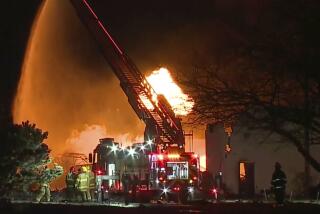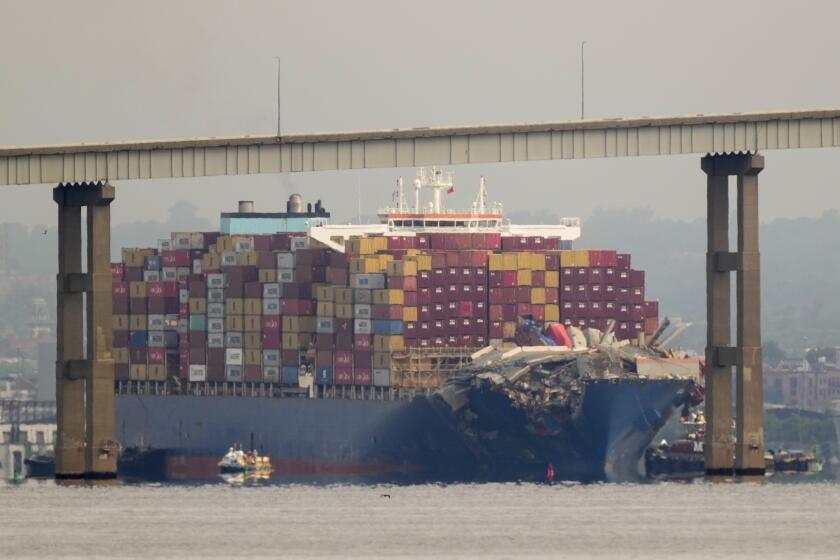Americans in Key Jobs at S. Africa Nuclear Plant
Although legislation restricts U.S. assistance to South Africa’s small nuclear industry, American companies and personnel are playing key roles in the development and operation of the country’s first nuclear power station.
About 20 Americans are directly employed by the South African Electricity Supply Commission as reactor operators, physicists, safety inspectors and senior technicians at the Koeberg nuclear power station 20 miles north of Cape Town, a commission spokesman said Monday.
In addition, about 45 other Americans--all senior scientists, engineers and technicians--are working at the plant on behalf of U.S. firms hired by the commission to oversee instruction, advise it on maintenance, help develop emergency plans and work on other specialized aspects of the plant’s development and operation.
More Americans will probably be recruited by the electricity commission, either directly or through U.S. contractors, when the second unit of the 1,840-megawatt plant goes into operation shortly, according to Andre van Heerden, regional information officer of the commission.
Measured against the plant’s current work force of 1,200 plus about 1,000 contractors’ employees, the American contingent is small, Van Heerden said. However, the U.S. technicians hold a number of key jobs, and their experience and expertise is vital to Koeberg’s smooth operation now and in the future because of the training they are giving to South Africans.
There are also substantial numbers of French, working for the French firms that are the principal contractors at Koeberg, and British, West German, Dutch, Israeli, Scandinavian and other foreign engineers and technicians employed directly by the commission or by various foreign contractors at the plant.
A 1983 U.S. law, intended to prevent the spread of nuclear weapons, requires Americans to get special authorization from the Department of Energy in Washington before “directly or indirectly” helping South Africa and certain other countries produce plutonium. A normal byproduct of a power plant’s nuclear reaction, plutonium can be used in weapons manufacture if processed properly.
Thirteen U.S. companies were authorized in September, 1983, to undertake maintenance, safety, training and related work at Koeberg under South African Electricity Supply Commission contracts. However, whether any individual American engineers, scientists and technicians have been given such clearance is uncertain. Ten more company contracts are reportedly awaiting approval in Washington.
Van Heerden said that his commission has advised its own American employees and Americans working for its contractors to “clarify their status” with the U.S. Embassy in South Africa. As a result, he said, the American personnel at Koeberg “are not here in contravention of U.S. law. I am quite sure of it.”
An American Embassy spokesman said that he could not confirm Van Heerden’s assertion. “We are in the process of coordinating all this with the commission and the Department of Energy in Washington to work things out in the best way for all concerned,” he said. “I cannot say we have resolved it all yet.”
The matter is particularly sensitive because South Africa refuses to sign the 1968 Nuclear Non-Proliferation Treaty and because the mood is growing in Congress for economic and other sanctions against South Africa for its apartheid policies of racial segregation.
Most Americans were hired for two or three years for specific tasks, such as developing an emergency plan and to train South Africans in key posts such as reactor operators and health physicists.
Van Heerden denied suggestions in Washington that U.S. law has been violated. “The main concern is the manufacture of nuclear weapons,” he said, “and nobody is exporting any weapons technology to South Africa.”
He said that South Africa’s has not signed the Nuclear Non-Proliferation Treaty because this country has developed a unique process for enriching uranium for commercial power reactors--but not for nuclear weapons--that it does not want to share with others or disclose to international inspectors.
More to Read
Start your day right
Sign up for Essential California for news, features and recommendations from the L.A. Times and beyond in your inbox six days a week.
You may occasionally receive promotional content from the Los Angeles Times.






